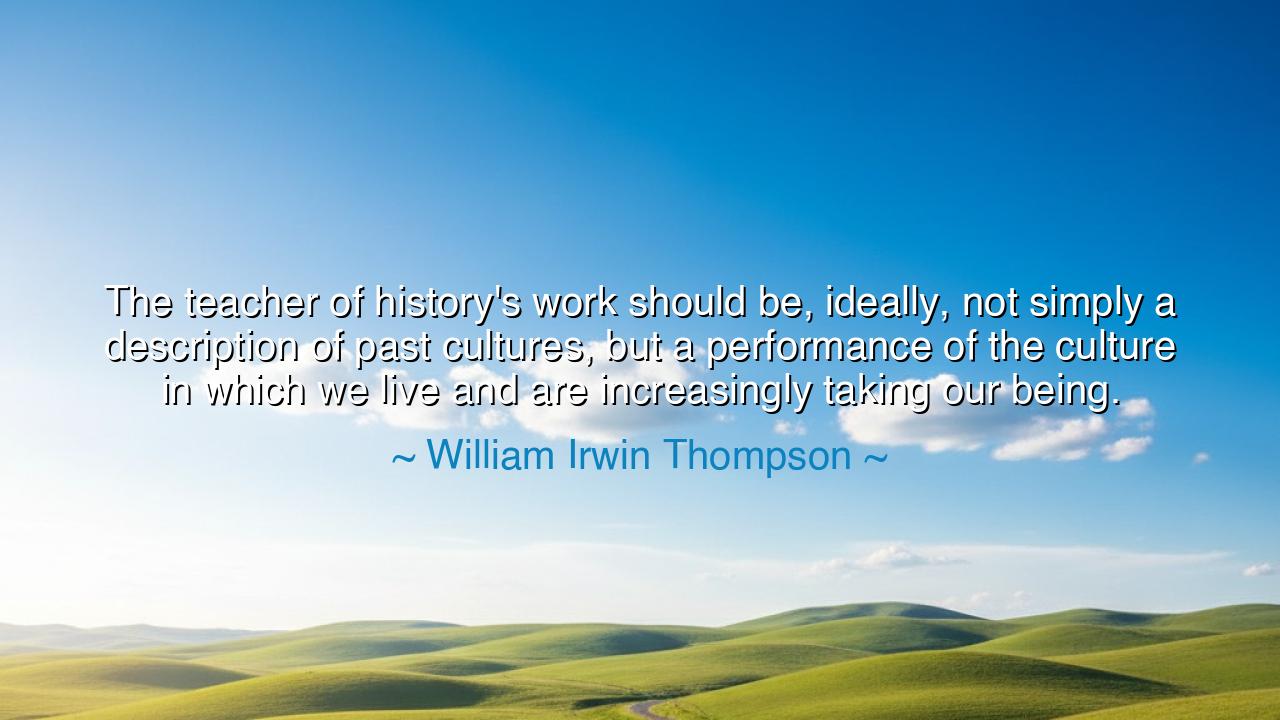
The teacher of history's work should be, ideally, not simply a
The teacher of history's work should be, ideally, not simply a description of past cultures, but a performance of the culture in which we live and are increasingly taking our being.






The words of William Irwin Thompson—“The teacher of history’s work should be, ideally, not simply a description of past cultures, but a performance of the culture in which we live and are increasingly taking our being”—resound like a trumpet call to reimagine what it means to teach history. He declares that the task of the historian or the teacher is not merely to record or repeat what has happened before, but to bring the past alive so that it speaks directly to the present, shaping how we understand ourselves and how we step into the future.
The meaning of this teaching is that history is not dead. It is not a graveyard of names, dates, and wars; it is a living river whose waters still flow into the seas of our present. The teacher of history must become a performer, breathing life into ancient voices, re-enacting their struggles, and showing how the destinies of past civilizations echo within our own. In doing this, history ceases to be a detached account—it becomes a mirror, in which we see both the reflection of what has been and the emerging form of what we are becoming.
This vision recalls the work of Herodotus, often called the “Father of History.” He did not merely list events, but told them as living tales, weaving myths, customs, and lessons into his chronicles. His history was not static, but performative, bringing readers into the texture of cultures far from their own. Likewise, Thompson suggests that the teacher of today must do more than recount—they must embody the connection between past and present, showing how the stories of others are woven into the very fabric of our own existence.
We see another example in the life of Martin Luther King Jr. Though not a teacher in the formal sense, he often stood as a historian of the African-American struggle, invoking the Exodus of the Hebrews, the words of the Founding Fathers, and the dreams of prophets past. In his speeches, the history of centuries was performed for the present moment, igniting hearts and reshaping a nation. This is the power Thompson points toward: history as a living act, not a dusty record.
The lesson for us is that we must not treat history as a relic but as a drama unfolding in which we, too, are actors. Every time we reflect on the rise and fall of empires, the triumphs of justice, or the failures of oppression, we are not merely gazing backward—we are rehearsing for our own choices today. The role of the teacher of history is to awaken this realization, to make students see that they are not separate from history but part of its ongoing performance.
Practically, this means that both teachers and learners must approach the past with imagination and responsibility. Teachers must go beyond memorization, using stories, re-enactments, and discussions to show how the present is a continuation of what came before. Learners must ask: What does this story demand of me today? How does the culture I live in reflect or diverge from those that came before? In doing so, history becomes not only knowledge but wisdom for action.
Therefore, let this wisdom be inscribed upon the hearts of all who would teach: the task is not merely to describe what has been, but to perform what it means now. For in the great stage of time, the past is the prologue, the present is the play, and the future waits to be written. The true teacher of history is not a recorder of the dead, but a guide of the living, showing that the stories of yesterday are the seeds of tomorrow.






AAdministratorAdministrator
Welcome, honored guests. Please leave a comment, we will respond soon